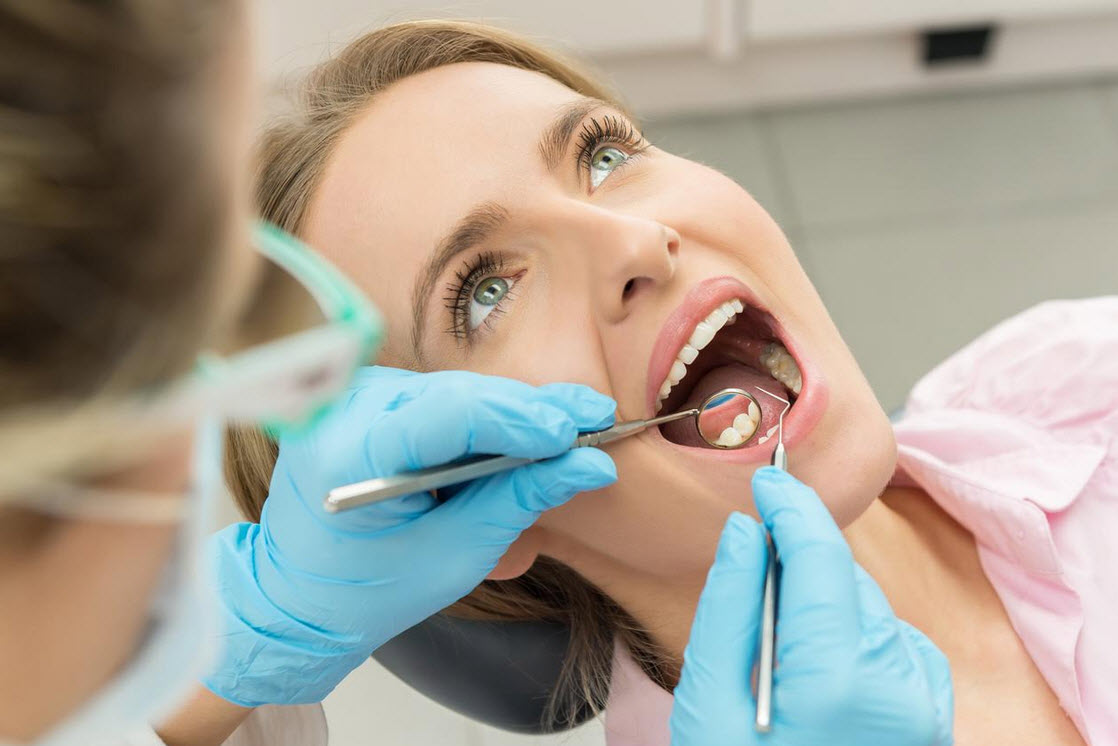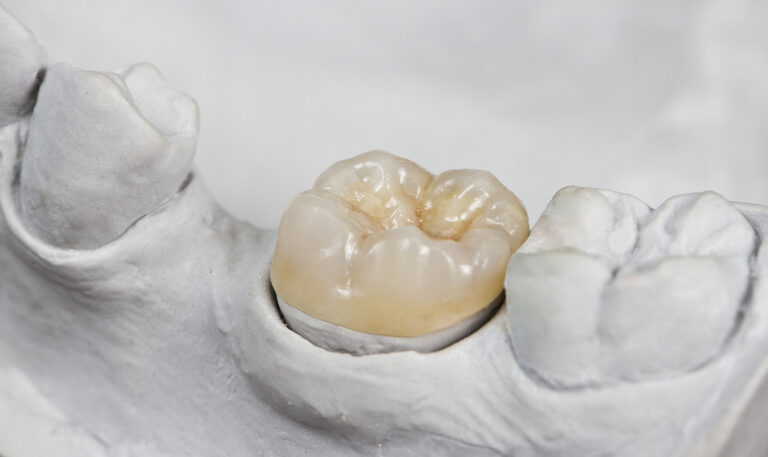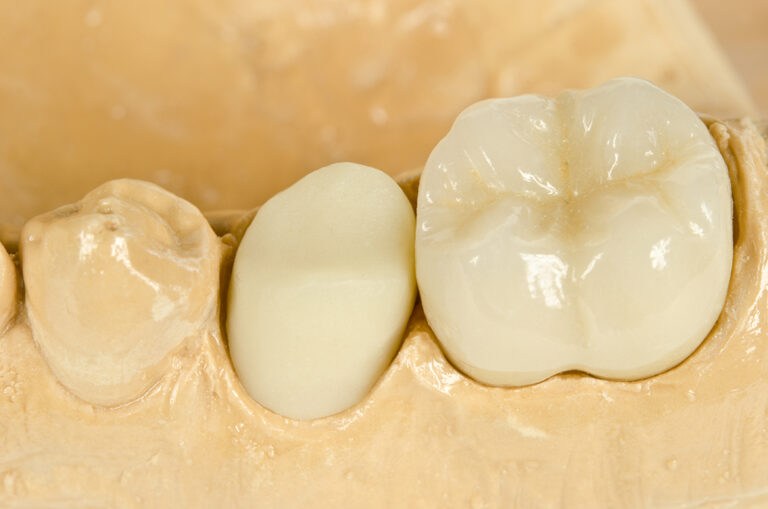Dental Crown Benefits
What Are Dental Crowns?
Dental Crown
If your tooth is damaged or weakened and dental fillings cannot fix it, you probably need a dental crown. Dental crowns are custom-made tooth-shaped caps that are placed over your damaged tooth.
Dental crowns can restore a tooth’s shape, size, strength, and function and improve a person’s smile and oral health. A dental crown will cover the entire visible portion of your tooth. A crowned tooth will feel, look, and function like your other teeth and should tolerate biting and chewing forces just like normal teeth.
What Is the Purpose of a Dental Crown?
Why Is a Dental Crown Needed?
Dental crowns may be used for a variety of purposes.
Some reasons your dentist may decide to use a dental crown may include:
- A weak tooth is more prone to be chipped, cracked or broken. Your dentist may use a dental crown for your weak tooth to protect it and prevent it from breaking.
- A severely worn-down chipped or broken tooth may need dental crowns.
- Dental crowns can restore the strength of a tooth that has gone through root canal therapy. After root canal treatment, your dentist will assess your tooth; if there is not much of the remaining tooth structure left, you will probably need a dental crown over the tooth to restore its strength.
- A dental crown can be a good option to cover misshaped or severely discoloured teeth.
- Dental crowns can be used to keep dental bridges in place.
- A tooth with a large filling and insufficient remaining tooth structure may require a dental crown to support and protect it.
- Sometimes, dentists use dental crowns to cover dental implants.
- Your dentist may decide to use a dental crown to make cosmetic modifications.
Dental Crown Procedure
Preparing Your Tooth for a Dental Crown
Patients will typically require two dental visits to prepare for a dental crown. Depending on the situation, the crown can be made right in the dentist’s office.
To place these permanent restorations on top of your tooth, your dentist needs first to prepare your natural tooth.
First Visit
Your first dental visit involves:
- an initial oral examination of your mouth
- Take x-rays your tooth and its surrounding bone
- treating possible existing cavities or infection
- performing root canal therapy if required
- preparing the tooth by filing it down
Note 1: Your dentist needs to file down your tooth to make room for your dental crown. The type of dental crown you receive will determine how much of your tooth structure needs to be filed away.
Note 2: In some cases, the remaining tooth structure is insufficient for dental crowns to be fitted on top of your tooth. Dentists will use a filling material to make up for the missing tooth structure.
- Now, it’s time to make an impression of your tooth using paste or putty to prepare your dental crown.
- Impressions will be sent to a dental laboratory. Your dental crown will be ready within two to three weeks.
- Meanwhile, you will receive a temporary crown to cover your prepared tooth until the final crown (permanent crown) is ready.
Second Visit
Your second visit involves your dentist:
- removing the temporary crown.
- Ensuring the colour of the permanent crown matches the colour of the surrounding teeth.
- They are cementing your permanent crown on the teeth.
Your dentist makes sure your permanent crown fits and sits comfortably next to your natural teeth.

What Are Same-Day Dental Crowns?
Can Dental Crowns Be Prepared in a Single Appointment?
CAD/CAM technology
Some dentists have the necessary equipment to create dental crowns on the same day of the dental appointment.
The initial steps of making a same-day dental crown procedure are similar to the traditional way of preparing dental crowns minus the step that involves receiving a temporary crown.
After preparing and shaping the tooth for a dental crown, the dentist will take digital pictures of the tooth using a scanning device. The computer software will make a virtual design model of the crown using digital scans of the photos. This data will be sent to the CEREC machine electronically to make dental crowns out of a block of porcelain material.
Your dentist will check the new crown before cementing it onto your tooth to make sure it matches the colour of your natural teeth.
Same-Day Permanent Dental Crown:
- No need for a temporary crown
- No need to send impressions to a dental lab
- No need to wait two to three weeks to receive your permanent dental crowns
- Are aesthetically pleasing and natural-looking
You can discuss the advantages and disadvantages of traditional dental crowns and same-day CEREC crowns and decide which suits your situation and preferences the most.

What Are Dental Crowns Made Of?
Different Types of Crowns
Various dental crowns are available, so you can choose whichever one suits you and your budget.
Here you can see different crowns, their materials, pros, and cons.
All-Metal Crown
As the suggests, all-metal crowns are entirely made out of metals. Several metals may be used to fabricate metal crowns like palladium, chromium, nickel, and gold.
Metal crowns rarely chip or break, are the most long-lasting types of crowns, and can withstand biting and chewing forces well. Metal crowns do not require a large amount of your tooth structure to be removed since they can be made in thin layers while maintaining their solid properties.
Due to their metallic colour, metal crowns are not the best option for your front teeth; they are rather typically used for out of sight molars.
Pros
- Superior strength
- Highly durable
- A great option for those with severe teeth grinding habits
- Are gentle to the opposing teeth and cause minimum wear to them
- Great compatibility properties
Cons
- not as aesthetically pleasing as porcelain or ceramic due to their metallic shade
For Your Information: By all-metal crowns, we do not mean your crown is made of pure metals. Pure metal lacks the necessary physical properties for dental appliances. What we mean is your crown is made of specific types of metal alloys. Metal alloys combine two or more metallic elements and have greater corrosion resistance.
The three basic categories of dental alloys used for dental crowns include:
High noble alloys (precious metal): Gold and metals from the platinum group, including platinum and palladium, are used in dentistry. Noble metals or precious metals are of high economic value, rare, malleable, ductile, and easy to work with.
The composition of high noble alloys:
- 60% noble metal (gold + platinum group) 40% will be gold
- 40% base metals (tin, copper and iron)
Noble alloys (semi-precious metal): The proportion of precious or noble metals used in semi-precious metal alloys is relatively lower (between 25% and 60% of any combination of noble metals)
Non-noble or base alloys (nonprecious metal): Non-noble alloys are also known as base metal alloys. Since base metal alloys are not as rare as noble metals, they cost less. Base metal alloys will oxidise and corrode easier. Aluminium, copper, nickel, and tin are examples of non-noble alloys. ( 75% base metals and less than 25% noble metal content)
All-Ceramic Crowns/All-porcelain crowns
Ceramic crowns are entirely made out of ceramic materials. Some specific types of ceramic crowns are made out of porcelain, a type of ceramic material; that’s why ceramic crowns are sometimes referred to as porcelain crowns.
Pros
All-ceramic crowns or all-porcelain crowns are suitable options for your front teeth since their colour blends with the colour of your natural teeth. An all-ceramic or porcelain crown can be a good option for those with metal allergies.
Cons
Ceramic or porcelain crowns may wear down their opposing teeth a lot more than metal or resin crowns. An all-porcelain crown or ceramic crown does not have the strength of porcelain-fused-to-metal crowns. Ceramic crowns require a larger amount of your tooth structure to be removed. Ceramic or porcelain crowns can aggravate the adjacent teeth.
Porcelain-fused-to-metal Crowns(PFM)
Dentists have been using porcelain fused to metal crowns or PFM for many years due to the strength and aesthetics they provide. Its metal structure makes this crown strong and highly durable, and the porcelain coating gives it a pleasing appearance.
The core of porcelain fused to a metal crown is made of metal cemented to the natural tooth. The porcelain part is bonded to the metal base providing a tooth-like shape and colour.
Pros
Porcelain fused to metal or PFM crowns provide a strong bond to your teeth and are great for your front and back teeth. Porcelain fused to a metal crown resembles a natural tooth because its colour matches its adjacent teeth.
Cons
The metal core may cause a grey line at the gum line.
The porcelain layer of a PFM crown may chip or fracture.
Porcelain fused to metal crowns may aggravate the neighbouring teeth and may cause more wear to the opposing teeth, especially in people with the habit of teeth grinding.
Stainless Steel Crowns
Dentists use a stainless steel crown for primary or milk teeth in children to prevent further decay. The crown will be cemented over the child’s prepared tooth and will eventually be lost when the child loses their primary tooth and gets their permanent tooth.
Stainless steel crowns used for adults are the temporary crowns fitting over their tooth or dental filling until their permanent crown is prepared.
Stainless steel dental crowns cost less than other crowns and, while they do not provide aesthetics, are very durable.
Resin Crowns
All resin crowns or composite resin crowns are also used for temporary dental crowns to protect a tooth or filling until the permanent crown is ready. All resin dental crowns are made from composite resin material.
This temporary dental crown can be considered a metal-free alternative to stainless steel crown. A resin crown can mimic the natural tooth colour, do not cost much, and won’t wear down an opposing tooth easily.
Resin dental crowns are temporary because they are not strong enough to withstand biting and chewing forces and will wear down over time. Being more susceptible to chipping and fracture is another reason a resin crown is used as a temporary crown rather than a permanent option.

How Long Do Dental Crowns Last?
While most dental crowns are highly durable, you cannot expect them to last forever. According to research, most crowns will stay intact for the first five years with proper care. About 50 to 80% of dental crowns last between 15 and 20 years.
Please avoid biting your fingernails, chewing on hard objects like ice, using your crowned or natural tooth as tools, or grinding your teeth while having a crown.
Does a Crowned Tooth Require Special Care?
Can a Crowned Tooth Decay or Stain?
While a crowned tooth does not require any specific care, a proper oral hygiene routine is essential since the tooth underneath a crown is not protected against decay or gum disease. Plus, a crowned tooth may stain like your natural tooth, so maintaining good dental hygiene is necessary.
It’s important to pay special attention to those dental crowns that are more prone to fracture.
Teeth Whitening on a Crowned Tooth
Can a Dental Crown be Whitened?
No! While teeth whitening is a good solution for your discoloured teeth, the treatment won’t affect a crowned tooth. Therefore, you can whiten your teeth’ natural enamel, but the crowned tooth colour will be different.
Alternatives to a Dental Crown
If dental crowns do not suit your condition, your dentist may recommend other dental procedures to improve your dental health.
Depending on your unique situation, alternatives to a dental crown may be:
- tooth removal
- dental implant
- dental bridge
We understand you still need more information or professional consultation.
Please feel free to call us on Pure Dentistry 0733434869 or visit us.





































